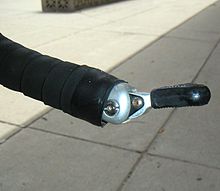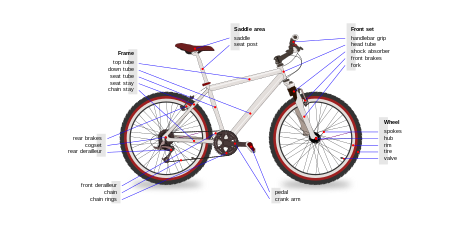Shifter (bicycle part)
This article needs additional citations for verification. (January 2021) |

A bicycle shifter or gear control or gear levers is a component used to control the gearing mechanisms and select the desired gear ratio. Typically, they operate either a derailleur mechanism or an internal hub gear mechanism. In either case, the control is operated by moving a cable that connects the shifter to the gear mechanism.
Location
[edit]

Traditionally shifters were mounted on the down tube of the frame or stem. For ergonomic reasons, they tend to be located somewhere on the handlebars on modern bicycles.
Mechanisms
[edit]
There are various types of shifter:[1]
- Grip shifter - a wheel with click stops surrounding the handlebar is turned until the desired gear is reached, though typically one gear at a time
- Trigger shifter - a lever is pulled or pushed to change gears one at a time
- Thumb shifter
- Road bike shifter - integrated with brake levers, sometimes known as a "brifter".[2]
In 1990, Shimano introduced their Shimano Total Integration, STI, shifting levers for road bicycles, this was an indexed shifting system and the first to integrate shifting with the brake levers. Campagnolo soon followed with their ErgoPower system. The SRAM Double Tap was introduced in 2005. [3][4][5]
See also
[edit]References
[edit]- ^ How to use bike gears
- ^ Road bike groupsets: everything you need to know
- ^ Herstatt, Cornelius; Hugo Tschirky; Christoph Stockstrom (2006). Management of technology and innovation in Japan. Birkhäuser. ISBN 9783540253266.
- ^ "Ergopower 1992 (in italiano)". Tears for Gears. December 1, 2009. Retrieved 2011-07-14.
- ^ Gary Boulanger (27 Nov 2007). "SRAM Force Double Tap shift/brake levers review". Bike Radar. Retrieved 2011-07-14.

